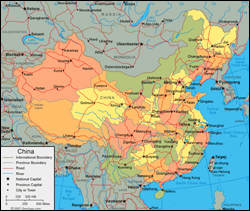China Guide
Profile
The People's Republic of China is located in the eastern part of the Asian Continent and features a land area of more than 9.6 million square kilometers, making it the fourth largest in the world behind only Russia, the U.S. and Canada.
China is a region with one of the longest histories in the world, dating back more than 5,000 years. The country has long been recognized for its impressive advancements in industry, architecture, arts, and language, before it was slowed by internal and external turmoil in its later history. In 1978, leaders focused on a more market-oriented economic development, which has since improved the personal freedoms and living standards for many people. China has shifted not only from central planning to a market economy, but also from a closed market to a global one.
China is indeed a country of natural splendor, from the majestic Himalayan Mountains to the mighty Yangtze River, the land is as broad and diverse as the culture that defines it. It is home to more than 1.3 billion people that make up some 56 nationalities all of which possessing their own culture and traditional customs. China is also one of the world's greatest natural and architectural achievements, from housing the largest ancient building complex in the world to the longest man-made architecture, the oldest tree and the greatest canyon... the list goes on.
Weather
Owing to its vastness, China's climate varies greatly from region to region. Moving from the south of China to the north, the climatic zones are tropical, subtropical, temperate, medium temperate, and frigid temperate. During the spring and autumn months, temperatures range from the low 50s to the low 70s F, with a limited amount of rainfall, while summers and winters bring on extreme heat and cold, varying in extremes south to north. >> China Weather
Economy
According to the National Statistics Bureau of the PRC, China's GDP reached 35.4 trillion RMB ($4.92 trillion USD) in 2009, up 8.7% year-on-year. By contrast, Japan's GDP in 2008 was 4.84% and expected to have slipped by 3% in 2009. Thus, it is believed that China has surpassed Japan to become the second largest economy in the world. The IMF forecasts China's growth at 10% for 2010 and 9.7% for 2011, led by fundamental growth drivers such as increasing labor productivity, urbanization and the growth of capital stock.
Beijing's target for 2010 is slightly less at 8%. The leadership's half-trillion dollar stimulus package is boosting key industries such as steel and automakers, and helping shore up exporters. China's leaders have stated that the best contribution they can make to offset the current global economic crisis is to keep their own economy growing. China is among the world's largest trading nations and a major importer and exporter of goods and services. In 2009, 23,435 foreign-invested companies were set up in China, and contract FDI reached $194 billion USD. Experts are saying that China's economy will be the world's largest in less than 25 years.
Tourism
China has set a development goal for its tourism industry in the "11th Five-year Plan" period (2006-2010), aiming to achieve across the board growth in the number of inbound tourists, international and domestic tourism revenue, and an overall tourism income of 10%. The World Tourism Organization forecasts that China will become the world's largest tourist destination and the fourth biggest tourist source by 2020.
According to the China National Tourist Office, more than 22 million foreign tourists visited China in 2006, an increase of nearly 10% from the previous year. China's total income from the tourism industry is expected to amount to more than one trillion yuan ($151 billion) by the year 2010, making up 7% of the country's GDP.
Land of Opportunity
 To compare China with most other emerging markets is like comparing a Corvette to a Chrysler... from closed markets to capitalism on cruise control, China's been advancing at an accelerated pace that's at or exceeding a level of what neighboring countries like Japan, Hong Kong and even Taiwan have done during the past few decades: rise from the burden of poverty to burgeoning wealth. To compare China with most other emerging markets is like comparing a Corvette to a Chrysler... from closed markets to capitalism on cruise control, China's been advancing at an accelerated pace that's at or exceeding a level of what neighboring countries like Japan, Hong Kong and even Taiwan have done during the past few decades: rise from the burden of poverty to burgeoning wealth.
As a result of China's accession into the WTO, China committed to broad reforms in the areas of transparency, notice and comment, uniform application of laws and judicial review. Each of these reforms has helped to strengthen the rule of law in China and address practices that have made it difficult for U.S. and other foreign companies to previously do business in China.
China's inland provinces need infrastructure, which Beijing addressed with
a stimulus package of four trillion yuan ($586 billion) a few years earlier.
China is extending its railway network, rebuilding earthquake-damaged areas
in Sichuan, increasing export tax rebates, lending more to small and medium-size
enterprises and spending more on social welfare systems. Beijing is introducing
rural land reforms, increasing government funding for low-price housing and
basic medical services, and reducing interest rates in order to boost domestic
consumption. An advancement of capitalism will contribute to a rise in salaries
and thus a rise in consumerism from an increasingly affluent populace that’s
been hoarding away cash for years. Investors should continue looking toward
China for big future returns.
Selling Points
China has developed into a legitimate economic force moving into the next commercial phase investment and consumerism. The most populous and industrious nation in the world, today China and its people have the opportunity to be more economically focused for themselves, and this in turn creates countless opportunities for savvy investors and business people alike.
It is a huge country that is undergoing a huge population shift, with some 300 million people moving into urban areas from the countryside. Consequently, this will create enormous demand for real estate and tremendous growth potential for investors. While major cities like Beijing and Shanghai are already major fixtures on the global scale, expansion will continue and the population level will increase; there will also be a spillover effect into the many "Second Tier" cities along the coast and toward the west that will stand to benefit by increased habitation and concurrent development. And Chinese real estate in many parts of the country is still an undeniable bargain by Western standards.
Not only adding to the intrigue, but also substantiating China's ascension into a burgeoning world superpower, aside from the Beijing Summer Olympics and the 2010 Shanghai World Trade Expo, China will be host to the Winter Olympics in 2020.
Business Opportunities
Have you wanted to develop a presence in China and tap into its booming economy and bright future? We can assist you. We operate from within the States and China. Between our knowledgable local team and network of professionals, we can assist you to establish or extend your business operations in China and guide you through the entry process. We also represent several local Chinese companies ready to connect with foreign businesses to help fill their needs! Contact us today to see how we can assist you to get started.
Visit Our China Gallery & Business Services
Please click an image below to make a selection.
China Gallery
 |
Business Services
 |
For questions about our services or to schedule an appointment with one of our representatives, please email us at: info@vinniesworld.com. You may also use our convenient Contact Us form.
|